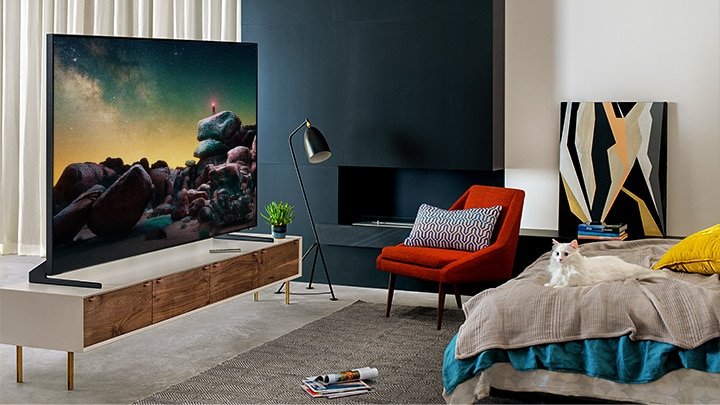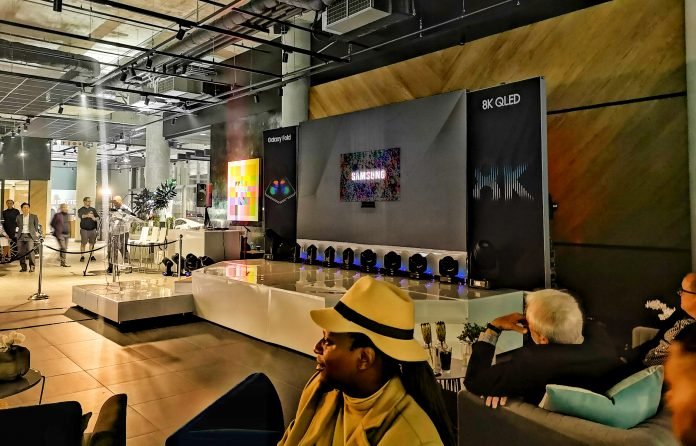WE’HAVE COME a long since the days of black and white TV and the gradual collapse thereof, of households still using this once highly prized possession. And as we continue to navigate the transition to colour, TV manufacturing’s new buzzwords like LCD (Liquid Crystal Display), O-Led (organic light emitting diode) and Q-Led are becoming some of today’s common jargons which tech enthusiasts simply can’t ignore.
The latter (Q-Led), which is Samsung’s new branding for its series of high-end TVs refers to LED TV using quantum dots to enhance picture quality. First announced at CES 2017, the 8K is the current highest ultra high definition television, delivering more nuanced brightness and colour volume as compared to your standard HD TVs (2K) and their 4K counterparts.

The Korean tech giant has taken things up a notch with the launch of the 8K Q-Led TV line, which comes just over a year after the launch of the 4K TV variations. The South African launch was led by Samsung Africa CEO Sung Yoon, who enthusiastically took us back to Samsung’s humble beginnings, all the way to its current position as the global tech leader. “As we all know, this is a special year for Samsung as we celebrate our 50th anniversary. Samsung TV has been leading the global TV market share for all these years, a world record for the electronic industry which deserves a special celebration.”
The 8K hype, why it matters to consumers
As the battle of the highest resolution TVs start to heat up, as to why do we need the gigantic 8K TV, is the one question most would like to get true answers for? But perhaps the next question should be, ‘what is the most important to consumers when choosing the right TV?’
“Most people would say they look for picture quality,” Yoon says. “So with the 8K, the screen shows you more depth and details than our naked human eye can. That means it’s almost 3D viewing experience without the glasses of course, which is enough convenience for the consumer.”
So how did Samsung achieve this?
Says Yoon: “With the 4K, you have 8 million pixels, while the new 8K has a whopping 33 million pixels. This is 16 times more than full HD TV with 2 pixels and four times better resolution than the 4K TV. This is a huge difference as you can see.”

The 8K TV is Artificial Intelligence (AI) driven and that doesn’t end with inter-connective devices. Likewise Samsung 8K Q-Led reportedly uses AI to upscale content from the original formats. “This means if you have a 4K content, it will be almost as great as the 8K resolution. And if you have the full HD content, it will even look better than the 4K content. So all of you rugby and cricket fans in South Africa, this year’s World Cups will look like you are live in the stadium,” he says in reference to Samsung’s partnership with the Cricket and Rugby World Cups in the UK and Japan respectively.
Things consumers look out for when buying TV
Except for the picture quality, the other consideration for some when buying a TV is the design, that “blends well with their lifestyle.” Others, Yoon adds, will say smart connectivity and the internet of things. “While elegant design is important for TV, people want their TVs to match their home deco. They also want to deal with fewer cables and eliminate the clutter that comes with using multiple cables. That’s why the 8K TV comes with one invisible cable that seamlessly integrates everything – data and power – into a single cable. So all that you end up with is clean screen and no clutter.”

AI, it’s clear, is at the heart of Samsung’s technical dna across all products including mobile, TV, fridges and appliances, Yoon further explains. “So we will include all this across all products, meaning that the TV’s AI processor will recognise your voice with contextual understanding.”
As part of the SmartThings, the system will let users play media and content from their compatible devices to a Samsung TV. “Imagine you come home after work and switch on the TV, immediately your favourite show is on the screen. It seems like a coicidence but it’s actually Bixby (Samsung’s AI developed assistance) learning about what you like and what you don’t. So it’s a good thing as it is forever adapting to your preferences.”
Pricing & availability
Available from May, the Samsung 8K Q900 Q-Led series start from R76,999 for the 65-inch, all the way to R999,999 for the 98-inch.
For a limited time until May 5, 2019, customers will receive a free Samsung soundbar with every purchase of the 2019 QLED TV. Available at selected stores countrywide as well as Samsung SA online store, the offer also comes with Samsung Signature Service which includes delivery and installation.
*For the latest brand focused South African news / product launches, make sure to visit NOWinSA dailyHi


